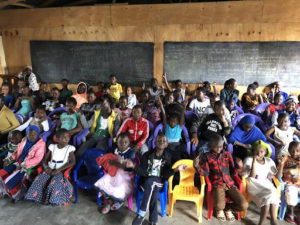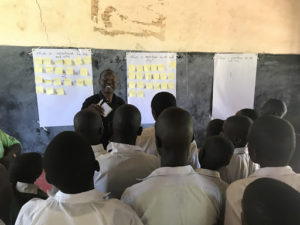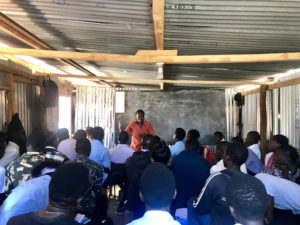GlobalGiving’s Kenya Field Traveler, Isabelle Hall, shares perspectives from four nonprofit leaders advocating for gender equality.
With programs focused on girls popping up left and right, some gender equality advocates in Kenya believe boys are being left behind. Would any group with traditionally authoritative power feel oppressed by these egalitarian efforts, or does prioritizing girls’ needs require pushing boys aside?
While traveling throughout Kenya for GlobalGiving’s Field Program, I met dozens of nonprofit leaders, many of whom focus on gender equality. Here’s what some of them have to say about the social realities—and potential futures—of Kenya’s young girls and boys.

“Gender equality cannot be achieved without changing the perception that gender issues are women’s issues, rather than societal issues.
At Carolina for Kibera, we utilize male involvement as a strategy to achieve gender equality by mentoring boys from an early age to be gender-sensitive and unlearn negative behaviors that are used to define what manhood is.
Empowering girls is not all that is needed. We need to empower boys, too.”
—Ann Kungu, Impact Manager at Carolina for Kibera

“In the African social sector, the attention balance has tilted too much to the girl’s side. Suddenly, the man was out of the picture. Equality is not equal when there is allocation of resources on one side of the balance than the other. Today, you often hear that what a boy can do, a girl can do better. Instead of working on the inherent strengths in both, the current rhetoric sets them in competition against each other.
The intersection between modernity and traditional practices has thrown the boy child into a wilderness of identity. Safe Spaces is trying to bridge this gap by including boys in our reproductive health workshops in schools and also having weekly informal meetings with the boys teaching them basketball and life skills. We also organize one-on-one talks with parents to equalize the home chores between the boys and the girls to promote a balanced environment.
Empowering one gender must never be synonymous with stifling the other. We must realize that we need a functional man and woman for a functional society.”
—Peninah Nthenya, Founder and Director at Safe Spaces Africa

“The patriarchal nature of our communities, combined with cultures perpetuating male privileges and dominance over women, caused women to lag behind in various aspects of development. As a result, efforts such as affirmative action and girl child empowerment programs developed. However, I tend to believe this was done without due considerations for checks and balances, ensuring the gap is bridged and not creating another gap in level of empowerment skewed against men.
Triggered by our own observations and concerns from various stakeholders, Umoja Partnership, Inc. staff decided to do some local research. This revealed a decrease in boy’s enrollment and retention in school, their unwillingness to participate in various school activities and take up leadership roles, a drop in academic performance, high incidence of involvement in crime, and anti-social activities likely due to a lack of mentorship.
In response to this, we bring grade 6-8 boys together with facilitators and guest speakers twice a school term to provide role-modeling and mentorship to motivate and support the boy child. We’ve also begun a mentorship seminar and retreat for high school and post-secondary schoolboys. The project has already been receiving feedback from the teachers and guardians in our partner school that the boys are having fewer behavioral issues and more engagement in the classroom.”
—Leonard Otieno, Kenya Project Director at Umoja Partnership

“Raising Futures Kenya’s Seed of Hope vocational training program was initially implemented to equip and empower girls and young women from vulnerable backgrounds.
For ten years, girls and young women were specifically targeted to receive vocational skills, business skills, and life skills at our training centers and were being supported to gain employment or start their own business to become self-reliant.
Around 2010, parents started to request that their sons receive support, too. The affirmative action and campaigns by human rights groups, women activists, and civil society in Kenya toward empowering the girl child has been so intense in that a boy’s place in the community was new, uncertain, and leading the boy to face his own set of challenges that needed to be addressed.
In response to this, towards the end of 2011, our vocational training center in Nairobi opened its doors to the first group of boys from the surrounding community and offered a Motor Vehicle Mechanic course. One year later, a decision was made by our Board of Management to have all-inclusive mixed-gender courses across all our centers in order to accommodate both boys and girls.”
—Sherry Waweru, Kenya Projects Officer at Raising Futures Kenya
Equality cannot be a zero-sum game, where if girls advance, boys fall by default. This shifting dynamic presents Kenya with an ability to reset the stage for its future—one that is more prosperous and confident—where all talent, regardless of gender, is leveraged to propel the success of a country brimming with opportunity.
Find exactly what you're looking for in our Learn Library by searching for specific words or phrases related to the content you need.